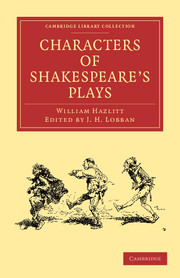Book contents
- Frontmatter
- Preface
- Contents
- Introduction
- Preface
- Cymbeline
- Macbeth
- Julius Cæsar
- Othello
- Timon of Athens
- Coriolanus
- Troilus and Cressida
- Antony and Cleopatra
- Hamlet
- The Tempest
- The Midsummer Night's Dream
- Romeo and Juliet
- Lear
- Richard II
- Henry IV
- Henry V
- Henry VI
- Richard III
- Henry VIII
- King John
- Twelfth Night; or, what you will
- The Two Gentlemen of Verona
- The Merchant of Venice
- The Winter's Tale
- All's Well That Ends Well
- Love's Labour's Lost
- Much Ado About Nothing
- As You Like It
- The Taming of the Shrew
- Measure for Measure
- The Merry Wives of Windsor
- The Comedy of Errors
- Doubtful plays of Shakespear
- Poems and Sonnets
- Notes
Twelfth Night; or, what you will
Published online by Cambridge University Press: 07 September 2010
- Frontmatter
- Preface
- Contents
- Introduction
- Preface
- Cymbeline
- Macbeth
- Julius Cæsar
- Othello
- Timon of Athens
- Coriolanus
- Troilus and Cressida
- Antony and Cleopatra
- Hamlet
- The Tempest
- The Midsummer Night's Dream
- Romeo and Juliet
- Lear
- Richard II
- Henry IV
- Henry V
- Henry VI
- Richard III
- Henry VIII
- King John
- Twelfth Night; or, what you will
- The Two Gentlemen of Verona
- The Merchant of Venice
- The Winter's Tale
- All's Well That Ends Well
- Love's Labour's Lost
- Much Ado About Nothing
- As You Like It
- The Taming of the Shrew
- Measure for Measure
- The Merry Wives of Windsor
- The Comedy of Errors
- Doubtful plays of Shakespear
- Poems and Sonnets
- Notes
Summary
This is justly considered as one of the most delightful of Shakespear's comedies. It is full of sweetness and pleasantry. It is perhaps too good-natured for comedy. It has little satire, and no spleen. It aims at the ludicrous rather than the ridiculous. It makes us laugh at the follies of mankind, not despise them, and still less bear any ill-will towards them. Shakespear's comic genius resembles the bee rather in its power of extracting sweets from weeds or poisons, than in leaving a sting behind it. He gives the most amusing exaggeration of the prevailing foibles of his characters, but in a way that they themselves, instead of being offended at, would almost join in to humour; he rather contrives opportunities for them to shew themselves off in the happiest lights, than renders them contemptible in the perverse construction of the wit or malice of others. –There is a certain stage of society in which people become conscious of their peculiarities and absurdities, affect to disguise what they are, and set up pretensions to what they are not. This gives rise to a corresponding style of comedy, the object of which is to detect the disguises of self-love, and to make reprisals on these preposterous assumptions of vanity, by marking the contrast betweeen the real and the affected character as severely as possible, and denying to those, who would impose on us for what they are not, even the merit which they have.
- Type
- Chapter
- Information
- Characters of Shakespeare's Plays , pp. 192 - 198Publisher: Cambridge University PressPrint publication year: 2009First published in: 1908

